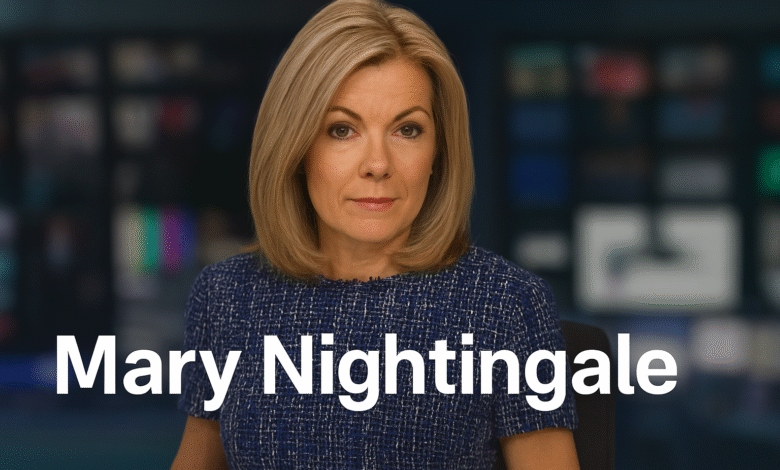Mary Nightingale Illness: The Untold Story Behind Her Voice Struggles and Comeback
How the ITV News anchor overcame vocal strain and became a voice for resilience in broadcasting

Mary Nightingale, the celebrated face of ITV Evening News, experienced a challenging health journey that could have silenced her career. Her battle with a mysterious voice condition drew public concern, but behind the scenes was a tale of strength, determination, and eventual recovery. Today, she continues to inspire both viewers and colleagues with her unwavering presence and professionalism.
Quick Biography Table
| Attribute | Details |
|---|---|
| Full Name | Mary Nightingale |
| Date of Birth | 26 May 1963 |
| Age | 62 (as of 2025) |
| Birthplace | Scarborough, North Yorkshire, England |
| Nationality | British |
| Ethnicity | White / British |
| Accent | Standard British |
| Education | Bedford College, University of London |
| Profession | Journalist, News Presenter |
| Known For | ITV Evening News Anchor |
| Health Condition | Vocal strain (not cancer) |
| Recovery Method | Vocal therapy, hydration, stress control |
| Husband | Paul Fenwick (married 2000) |
| Children | Two – Molly and Joe Fenwick |
| Net Worth | Estimated £1–5 million (approx. $1.2–6M) |
| Salary | Approx. £160,000 per year |
| Current Status | Active on ITV Evening News |
The Subtle Decline in Vocal Strength
Mary Nightingale’s illness began quietly. Subtle signs such as a fading voice, intermittent cracking, and difficulty projecting became noticeable during her live broadcasts. For a respected news presenter, these symptoms were not just inconvenient—they were alarming. Over time, the issue became more persistent and even interrupted live news segments.
As the anchor of one of the UK’s most-watched evening programmes, her voice was not just her tool—it was her identity. Mary found herself struggling behind the scenes, uncertain about the cause of her vocal deterioration and worried about its long-term implications.
Diagnosing the Real Cause
Vocal Strain, Not Cancer
Due to the nature of her symptoms, Mary underwent thorough testing over a period of more than a year. Among the primary concerns was the possibility of throat cancer. Thankfully, those fears were unfounded. Doctors ruled out cancer and instead diagnosed her with stress-induced vocal strain, exacerbated by years of public speaking without proper vocal support techniques.
The diagnosis brought relief but also a reality check. Her profession had taken a toll on her physical health. The remedy wouldn’t come from medication, but rather through lifestyle and behavioural changes focused on vocal care.
Personal and Professional Adjustments
To regain her voice, Mary Nightingale began working with vocal coaches—specialists in breath control and posture often used by singers and performers. She adjusted her daily habits, including staying hydrated, avoiding excessive caffeine, and ensuring she had time for vocal rest. ITV supported her by making schedule adjustments, allowing her time to recover without compromising broadcast quality.
Through consistent effort and expert guidance, she began to see improvement. Her voice regained its strength, and she gradually returned to delivering broadcasts with her usual poise.
Life After Illness
Public Support and Transparency
Once the public learned about Mary Nightingale’s illness, the response was overwhelmingly supportive. Viewers expressed admiration for her resilience, and many were surprised by how she continued working while undergoing a challenging recovery. Her transparency helped destigmatize vocal health issues, especially in high-pressure professions.
Mary’s openness turned her personal story into a broader conversation about mental and physical well-being in the media industry. It showed that even seasoned professionals can face challenges—and overcome them with dignity.
Continued Success at ITV
Despite her health scare, Mary retained her status as one of the UK’s most trusted news anchors. Since 2017, she has served as the sole presenter of ITV Evening News, leading major national coverage with renewed strength and clarity. Her experience has not only shaped her presentation style but also influenced how she balances personal wellness with professional demands.
Her resilience has reinforced her legacy as a respected figure in journalism. Today, Mary remains an example of professionalism, composure, and the ability to bounce back stronger.
Technology, AI, and Voice Misuse
The Deepfake Controversy
In 2024, Mary’s voice became the centre of controversy again—this time due to a deepfake video using artificial intelligence. A fake promotional clip circulated online, falsely featuring her likeness and voice endorsing a product. Mary called the incident “livid” and raised concerns about ethical use of AI in media.
The event highlighted how deeply intertwined a public figure’s voice can be with their identity. After years of protecting and rehabilitating her voice, its unauthorised use struck a personal and professional chord.
Media and Digital Identity
Mary Nightingale’s experience with both illness and AI voice misuse underscores the vulnerability of public figures in the digital age. Her career is a testament to the power of vocal communication—but also to the risks it carries. She has since advocated for greater protections and awareness around AI-generated content.
This modern challenge further demonstrates Mary’s adaptability. From personal health battles to public tech debates, she continues to be a voice—both literal and figurative—for trust, resilience, and integrity in media.
Legacy and Lessons Learned
A Model of Strength and Grace
Mary Nightingale’s illness did not define her—it revealed her resilience. Through recovery, continued success, and advocacy, she has shown what it means to endure and thrive in the face of adversity. Her story serves as inspiration for broadcasters and professionals alike.
Whether discussing health, media ethics, or the pressure of live television, Mary approaches each topic with humility and intelligence. She remains a pillar of strength in British journalism and an example for those navigating their own challenges.
Ongoing Influence in Journalism
As of 2025, Mary Nightingale continues to anchor ITV Evening News, contributing not just to the headlines, but to the very fabric of British media. Her voice is not just heard—it is trusted. From the early signs of vocal distress to her full recovery, Mary’s journey offers valuable insights into perseverance, recovery, and adapting to a rapidly evolving media landscape.
Frequently Asked Questions
What illness did Mary Nightingale have?
Mary Nightingale suffered from vocal strain due to stress and improper breath control. Throat cancer was ruled out during her testing.
How did she recover?
She worked with vocal coaches, improved her posture and breath support, stayed hydrated, and reduced stress through rest and therapy.
Is Mary Nightingale still on ITV?
Yes, she is the current anchor of ITV Evening News and continues to lead national broadcasts.
Was her voice used in a deepfake?
Yes. In 2024, a deepfake video falsely featured her voice promoting a product. She condemned the act and called for AI regulation.
What’s her impact on journalism?
Mary Nightingale remains one of the UK’s most trusted journalists. Her career highlights resilience, professionalism, and leadership.



